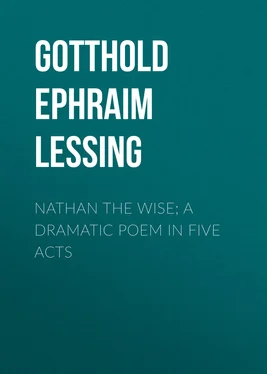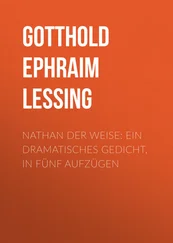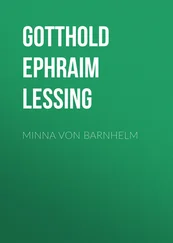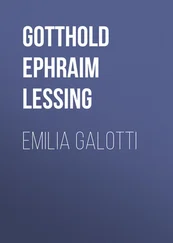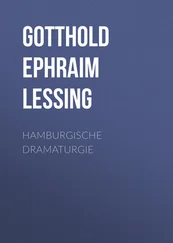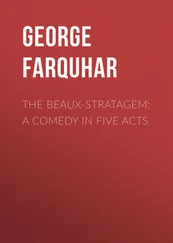NATHAN
And why incredible? Would you reject
This story, tho’ indeed, it’s often done,
To fix on something more incredible,
And give that faith? Why should not Saladin,
Who loves so singularly all his kindred,
Have loved in early youth with warmer fondness
A brother now no more. Do we not see
Faces alike, and is an old impression
Therefore a lost one? Do resembling features
Not call up like emotions. Where’s th’ incredible?
Surely, sage Daya, this can be to thee
No miracle, or do thy wonders only
Demand—I should have said deserve belief?
DAYA
NATHAN
Were you quite fair with me?
Yet even so, my Recha, thy escape
Remains a wonder, only possible
To Him, who of the proud pursuits of princes
Makes sport—or if not sport—at least delights
To head and manage them by slender threads.
RECHA
If I do err, it is not wilfully,
My father.
NATHAN
No, you have been always docile.
See now, a forehead vaulted thus, or thus—
A nose bow’d one way rather than another—
Eye-brows with straiter, or with sharper curve—
A line, a mole, a wrinkle, a mere nothing
I’ th’ countenance of an European savage—
And thou—art saved, in Asia, from the fire.
Ask ye for signs and wonders after that?
What need of calling angels into play?
DAYA
But Nathan, where’s the harm, if I may speak,
Of fancying one’s self by an angel saved,
Rather than by a man? Methinks it brings us
Just so much the nearer the incomprehensive
First cause of preservation.
NATHAN
Pride, rank pride!
The iron pot would with a silver prong
Be lifted from the furnace—to imagine
Itself a silver vase. Paha! Where’s the harm?
Thou askest. Where’s the good? I might reply.
For thy it brings us nearer to the Godhead
Is nonsense, Daya, if not blasphemy.
But it does harm: yes, yes, it does indeed.
Attend now. To the being, who preserved you,
Be he an angel or a man, you both,
And thou especially wouldst gladly show
Substantial services in just requital.
Now to an angel what great services
Have ye the power to do? To sing his praise—
Melt in transporting contemplation o’er him—
Fast on his holiday—and squander alms—
What nothingness of use! To me at least
It seems your neighbour gains much more than he
By all this pious glow. Not by your fasting
Is he made fat; not by your squandering, rich;
Nor by your transports is his glory exalted;
Nor by your faith his might. But to a man—
DAYA
Why yes; a man indeed had furnished us
With more occasions to be useful to him.
God knows how readily we should have seized them.
But then he would have nothing—wanted nothing—
Was in himself wrapped up, and self-sufficient,
As angels are.
RECHA
And when at last he vanished—
NATHAN
Vanished? How vanished? Underneath the palms
Escaped your view, and has returned no more.
Or have you really sought for him elsewhere?
DAYA
No, that indeed we’ve not.
NATHAN
Not, Daya, not?
See it does harm, hard-hearted, cold enthusiasts,
What if this angel on a bed of illness—
RECHA
DAYA
RECHA
A cold shudder
Creeps over me; O Daya, feel my forehead,
It was so warm, ’tis now as chill as ice.
NATHAN
He is a Frank, unused to this hot climate,
Is young, and to the labours of his calling,
To fasting, watching, quite unused—
RECHA
DAYA
Thy father only means ’twere possible.
NATHAN
And there he lies, without a friend, or money
To buy him friends—
RECHA
NATHAN
Lies
Without advice, attendance, converse, pity,
The prey of agony, of death—
RECHA
NATHAN
He, who, for one he never knew, or saw—
It is enough for him he is a man—
Plunged into fire.
DAYA
O Nathan, Nathan, spare her.
NATHAN
Who cared not to know aught of her he saved,
Declined her presence to escape her thanks—
DAYA
NATHAN
Did not wish to see her more
Unless it were a second time to save her—
Enough for him he is a man—
DAYA
NATHAN
He—he, in death, has nothing to console him,
But the remembrance of this deed.
DAYA
NATHAN
And you kill him—or might have done at least—
Recha ’tis medicine I give, not poison.
He lives—come to thyself—may not be ill—
Not even ill—
RECHA
Surely not dead, not dead.
NATHAN
Dead surely not—for God rewards the good
Done here below, here too. Go; but remember
How easier far devout enthusiasm is
Than a good action; and how willingly
Our indolence takes up with pious rapture,
Tho’ at the time unconscious of its end,
Only to save the toil of useful deeds.
RECHA
Oh never leave again thy child alone!—
But can he not be only gone a journey?
NATHAN
Yes, very likely. There’s a Mussulman
Numbering with curious eye my laden camels,
Do you know who he is?
DAYA
NATHAN
DAYA
NATHAN
DAYA
And now the treasurer of Saladin.
NATHAN
Al-Hafi? Are you dreaming? How was this?
In fact it is so. He seems coming hither.
In with you quick.—What now am I to hear?
Nathan and Hafi
HAFI
Aye, lift thine eyes in wonder.
NATHAN
Is it you?
A dervis so magnificent!—
HAFI
Why not?
Can nothing then be made out of a dervis?
Читать дальше
